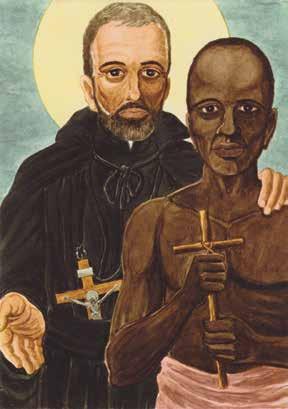Special
Adult females as altar servers Guest Column Father Glenn LeCompte
Some of you may have noticed that recently for some diocesan liturgies adult women have functioned as altar servers. These ladies were enthusiastic to be asked to serve and did a fine job of serving. In discussing with some people the topic of women exercising service at the altar, while some accepted the fact that girls serve at their parishes, they did not understand why women might be asked to serve. For the benefit of all, permit me to explain. The Canon Law Society of America’s edition of the Code of Canon Law translates Canon 230.2 as follows: “Lay persons can fulfill the function of lector during liturgical actions by temporary deputation; likewise, all lay persons can fulfill the functions of commentator or cantor or other functions, in accord with the norm of law.” In 1994, the Pontifical Council for the Interpretation of Legislative Texts responded to a question as to whether or not the liturgical functions mentioned in Canon 230.2 might be performed by men and women alike, and whether serving at the altar might be included among those functions. Referring to a decision made at an earlier meeting of the Council (June 30, 1992), the Council replied, “Affirmative and according to instructions by the Apostolic See” (https://www. catholicculture.org/culture/library/ view.cfm?recnum=5212). This answer was confirmed by Pope John Paul II on July 11, 1992 (New Commentary on the Code of Canon Law, Paulist Press, 2000, p. 300, footnote 61). The commentary on Canon 230.2 (in the work just cited) makes reference to the Pontifical Council’s decision mentioned
LAWRENCE CHATAGNIER/BAYOU CATHOLIC
above when it reiterates, “... in 1994, a general permission for the use of female altar servers was granted, subject only to the judgment of the individual bishop in light of particular circumstances in his own diocese.” In addition, the same commentary also explains, “This paragraph of the canon allows for the establishment of other liturgical functions (other than lector, commentator or cantor), depending on the needs of the local church. Such ministries are open to both men and women, and the canon does not place any age restrictions on those who might seek to fulfill these duties.” Regarding the requirements for youth to begin
24 • Bayou Catholic • Diocese of Houma-Thibodaux • September 2020
serving, the United States Conference of Catholic Bishops maintains, “Servers should be mature enough to understand their responsibilities and to carry them out well and with appropriate reverence. They should have already received holy Communion for the first time and normally receive the Eucharist whenever they participate in the liturgy” (http://www.usccb. org/prayer-and-worship/the-mass/ frequently-asked-questions/guidelinesfor-altar-servers.cfm). The key issue in the interpretation was the understanding of the Latin term laici, which is translated “lay people” in the English edition of
a








